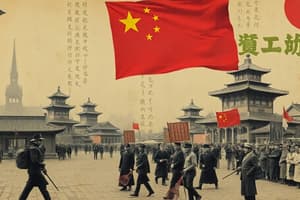Podcast
Questions and Answers
What defines modern history?
What defines modern history?
- The period before the Industrial Revolution
- The period after the late 19th century (correct)
- The era before the late 19th century
- The era before World War II
Who are some major historical figures from modern history?
Who are some major historical figures from modern history?
- Winston Churchill, Gandhi, and Napoleon
- Stalin, Cleopatra, and Franklin D. Roosevelt
- Churchill, Roosevelt, and Mao Zedong (correct)
- Cleopatra, Gandhi, and Churchill
What characterized modern history in terms of societal changes?
What characterized modern history in terms of societal changes?
- Industrialization, urbanization, and globalization (correct)
- Agricultural development, isolationism, and decentralization
- Colonial expansion, scientific decline, and cultural homogeneity
- Nomadism, technological stagnation, and regionalism
Which event marked the end of World War II?
Which event marked the end of World War II?
What can rebellions or revolutions lead to?
What can rebellions or revolutions lead to?
Who might have been executed in ancient times for rebelling against authority?
Who might have been executed in ancient times for rebelling against authority?
What historical movements can result from people rebelling against authority?
What historical movements can result from people rebelling against authority?
Which ideologies emerged during modern history?
Which ideologies emerged during modern history?
What were some effects of industrialization during modern history?
What were some effects of industrialization during modern history?
'Rebellion and Revolution' are terms used when people rebel against:
'Rebellion and Revolution' are terms used when people rebel against:
Flashcards are hidden until you start studying
Study Notes
History
History is the record of events as they unfold over time, documenting human experiences from their earliest origins up until today. It serves as a chronological account of humanity's past, encompassing various periods, cultures, regions, and civilizations around the world. While it often focuses on significant events such as wars, political changes, technological advancements, and cultural shifts, history also delves into everyday life, social customs, religious practices, economic systems, and much more.
Modern History
Modern history refers to the period after the late 19th century, which marked the end of World War II in 1945. This era witnessed profound societal transformations due to industrialization, urbanization, globalization, and the emergence of new ideologies like communism and fascism. Major historical figures of this time included Winston Churchill, Franklin D. Roosevelt, and Gandhi, who played crucial roles in shaping the course of history during this pivotal period.
Rebellion and Revolution
When people rebel against authority or oppressive systems, it can lead to notable historical movements known as rebellions or revolutions. In ancient times, rebellious subjects might have been executed. However, these acts of defiance throughout history have often led to significant change. For example, the French Revolution was triggered by widespread dissatisfaction with the monarchy, culminating in the beheading of King Louis XVI and the rise of Napoleon Bonaparte. Similarly, the American Revolution began as a dispute between Great Britain and its thirteen colonies in North America, eventually leading to the establishment of the United States of America. These examples show how rebellion can sometimes reshape entire societies and nations.
Studying That Suits You
Use AI to generate personalized quizzes and flashcards to suit your learning preferences.




